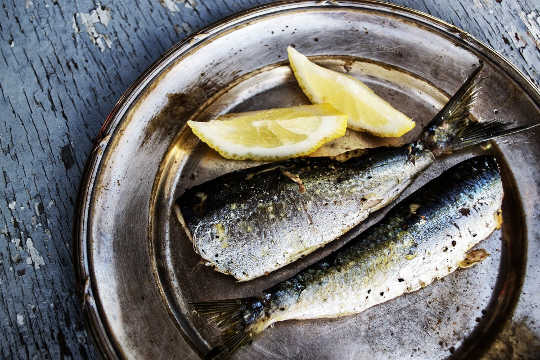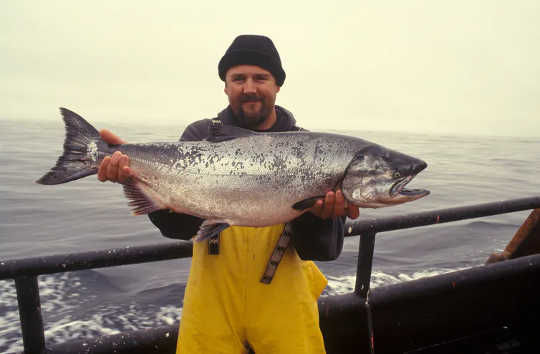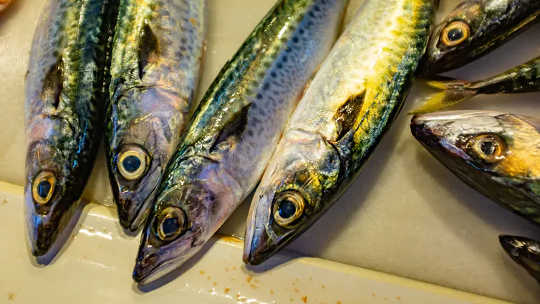
Sardines are rich in oils and protein. Image by DanaTentis
Eating fish can provide powerful advantages for the heart and brain, yet Americans eat less than half of the 26 pounds per year that experts recommend. By contrast, Americans buy seven times more chicken and beef annually than fish.
Why Americans don’t eat more fish has been pondered for a long time by health experts, fish farmers and fishermen themselves. One way to consider this question is production. Consumers can buy a product only if it’s available. The more they buy, theoretically, the more that item will be produced. In this case, a greater demand for fish would be stimulated if more fish were offered for sale.
 Salmon caught in the Pacific Ocean is a prize catch. Photo by NOAA for Unsplash.
Salmon caught in the Pacific Ocean is a prize catch. Photo by NOAA for Unsplash.
More seafood could be made available for American consumers from global ocean sources given that at least 60% of seafood in the U.S. is imported. U.S. aquaculture has the capacity to significantly increase. Research conducted by the National Oceanic and Atmospheric Administration Fisheries also indicates slightly more domestic wild-caught fish can be harvested.
Get The Latest By Email
Why eat fish?
Rich in lean protein and long chain omega-3 fatty acids, fish provides robust nutritional benefits that can help ward off chronic disease, boost immunity and reduce inflammation in the body. Seafood provides your body with critical omega-3 fats and minerals, like selenium, zinc, iron and iodine. It also provides vitamins B12 and D that fend off heart disease, among other benefits.
Fish provides such positive benefits for the body that recent USDA Dietary Guidelines offer guidance specific to pregnant women and children based on the finding that seafood consumption leads to cognitive improvement in children. Research shows that integrating seafood into a diet as a way to prevent coronary disease can lead to a potential annual health care savings of US$12.7 billion.
Additionally, seafood, as a protein, has a relatively low greenhouse gas production. This benefit is heightened when analyzing the many species that offer both high nutrient density and low greenhouse gas production.
Fish beyond shrimp
The 2015-2020 USDA Dietary Guidelines suggest that Americans eat 26 pounds of seafood each year. The recommended amount would ideally provide 250 mg per day of the important omega-3 fats. Yet because of how American consumers purchase seafood, this provides them with, on average, only 38% of the recommended daily omega-3’s.
Many of the most popular seafoods purchased by consumers are relatively low in omega-3’s, such as shrimp, the most popular seafood in the U.S., comprising nearly 30% of annual fish sales. Considering the 10 species that make up 85% of fish available for Americans to buy in restaurants and markets, only salmon, the second most popular seafood item, has relatively high levels of omega-3’s.
 Fish oil can protect the heart. Photo by Gunnar Ridderstrom for Unsplash., CC BY-ND
Fish oil can protect the heart. Photo by Gunnar Ridderstrom for Unsplash., CC BY-ND
There are many species of fish high in omega-3’s that are not regularly purchased or eaten, such as anchovies, herring and sardines. People can replace eating fish by taking supplements or eating other foods, such as eggs that contain omega-3’s, to help overcome this deficiency. However, research shows that eating fish itself is better than supplements, given that a fish filet has a full complement of fats, vitamins, minerals and other supporting molecules.
The health and environmental benefits of fish make it a smart choice to buy and eat. With more people at home because of the pandemic, this is a good time to explore recipes and enjoy this nutritionally important food.
About the Author
Michael Tlusty, Associate professor, University of Massachusetts Boston
This article is republished from The Conversation under a Creative Commons license. Read the original article.
books_nutrition







